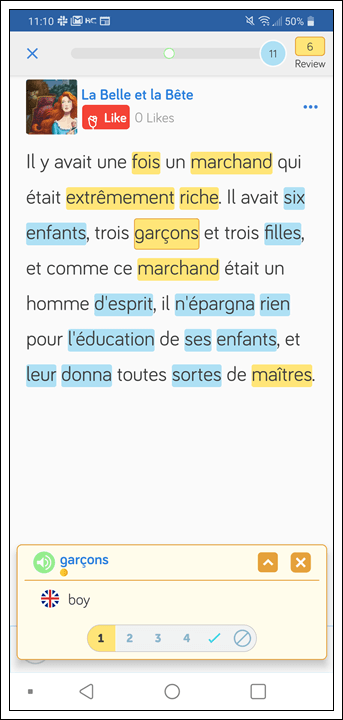How to Deal with French Negation
The most important lesson I learned about speaking a new language is to stop trying to be perfect. Language is not an exact science! In science there is often a clear true or not true – right or wrong – correct or not. But, languages are a human invention. Languages do not have completely logical or entirely consistent rules. This makes languages, and language learning in general, a minefield for perfectionists!
When it comes to understanding French sentence structure, it helps to be positive and not too self-critical when you’re dealing with negation. That is to say, don’t stress about being perfect when learning how to say “not” or other negatives in French. I’d like to show you a few things today to get you started off on the right foot in that journey. Let’s start with the basics.
The Basics of French Negation
The word “not” in French is “ne pas”. So, if you want to say, “It’s important not to speak,” you’d say “C’est important de ne pas parler.” Got it? Good, because now we’re strapping in for a real wild ride!
In most cases, ne and pas are not stuck together; that’s only for when you’re using the infinitive form of the verb (i.e. the way the verb looks when not conjugated, as in: “to speak” rather than “said”).
In most cases, the ne and pas are used at either end of a verb, in any tense, to say the negative version. Have a look at the example below.
E.g.
I am talking. → Je parle.
I am not talking. → Je ne parle pas.
I don’t talk. → Je ne parle pas.
Did you see what I did there? Always a great thing that in French there is no difference between the progressive, “ing” form of the verb and the simple present tense form. That doesn’t change when negating verbs in French, so it’s still two for the price of one!
Conjugating and negating French verbs takes a lot of mental work and most people just have to start noticing them as part of French conversations. As always, the best tip is to dive into language practice and learn by making mistakes. Trial and error. Once you have the hang of the basic pattern of French negation, you’re all set for the majority of basic conversational scenarios.
Now, let’s take a look at intermediate-level scenarios requiring more complex forms of French negation.
That’s not a pickle!
I wanted the heading to read That’s a Pickle!, but this article is about French negation.
When you’re speaking your native or “first” language, you say complex things all the time, without having to work at it. Just using a word like “never”, “nothing” or “none”, can change the meaning of a negative sentence in subtle and complex ways. The same goes for French, or any other “second” language. We sometimes need to express complex ideas and this means learning equally complex language.
So, what if you want to use the word never or nothing in French? Have a look at a couple examples.
E.g.
He never walks / He’s never walking → Il ne marche jamais.
She buys nothing / She’s buying nothing → Elle n’achete rien.
See how that works? We just replace the pas.
Pro-tip: Please don’t stress about the n’ in the above examples. If you don’t already know, in French we usually don’t like having two vowels in a row, so the e is removed from ne whenever the verb starts with a vowel.
One more thing: in double-verb constructions, for example, saying you want something or can do something, the ne and pas always go around the first verb in the sequence.
E.g.
I do not want to buy a horse. → Je ne veux pas acheter un cheval.
I cannot play the guitar. → Je ne peux pas jouer la guitar.
The first verbs, veux and peux, in the above example are in between both ne and pas, and the second verb stays in it’s natural, un-conjugated form. This is logical because the thing being negated is the want and can part of the statement. We do the same in English.
Logical as this maybe be, it won’t stop you from making the common error of placing the ne at the beginning of the two-verb sequence and the pas after the two verbs, as in, “je ne peux jouer pas la guitar”.
And the best way to work this out is to listen and speak regularly in French!
Learn French Faster Using LingQ
Immersing yourself in French doesn’t require you to travel abroad or sign up for an expensive language program.
However, it can be a bit tiresome to find interesting content, go back and forth between sites, use different dictionaries to look up words, and so on.
That’s why there’s LingQ, the best way to learn French online because it lets you learn from content you enjoy!
You can import videos, podcasts, and much more and turn them into interactive lessons.

Keep all your favorite French content stored in one place, easily look up new words, save vocabulary, and review. Check out our guide to importing content into LingQ for more information.
LingQ is available for desktop as well as Android and iOS. Gain access to thousands of hours of audio and transcripts and begin your journey to fluency today.
Learning French? Check out polyglot and LingQ cofounder Steve Kaufmann’s YouTube video on how he learned French for some helpful language learning tips!
Philippe Croteau is a professional language consultant and language learner in Simcoe County, Ontario, where he lives with his great partner and two amazing daughters. He speaks French, English, Japanese, and can make a ton of mistakes in German, Russian, Hindi, Urdu, Spanish and Arabic.

